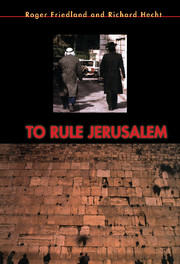Book contents
- Frontmatter
- Contents
- List of Illustrations
- Preface
- Acknowledgments
- Introduction
- 1 A Fearful Fusion
- Part I The Two Zions: Jews Against Zionism in Jerusalem
- Part II Zion Divine: Jerusalem as the Messianic Central City
- Part III Birth of a Nation
- 11 Platform for Palestine
- 12 Zion for Palestine
- 13 A State of Mind
- 14 The Islamic Challenge
- 15 Baghdad, Berlin, and Jerusalem
- Part IV Heart of Stone
- Notes
- Index
12 - Zion for Palestine
Published online by Cambridge University Press: 13 May 2010
- Frontmatter
- Contents
- List of Illustrations
- Preface
- Acknowledgments
- Introduction
- 1 A Fearful Fusion
- Part I The Two Zions: Jews Against Zionism in Jerusalem
- Part II Zion Divine: Jerusalem as the Messianic Central City
- Part III Birth of a Nation
- 11 Platform for Palestine
- 12 Zion for Palestine
- 13 A State of Mind
- 14 The Islamic Challenge
- 15 Baghdad, Berlin, and Jerusalem
- Part IV Heart of Stone
- Notes
- Index
Summary
Israeli sovereignty over a united Jerusalem freed the city to serve once again as the national center of the Palestinians. By winning Zion, the Israelis created a privileged political space where Palestinian elites could construct a new world view, a locus where Palestinian nationalism could confront Zionism face to face. Independent, democratic Palestinian nationalism was forged in and promulgated from Jerusalem. By uniting the city, the Israelis created the conditions for Jerusalem to emerge as the capital of Palestine. Jerusalem proved to be Zionism's central contradiction.
Everything in Jerusalem is divided into Jewish and Arab – clothing, cigarettes, beer, cafe's and restaurants, swimming pools, buses, blood banks, newspapers, football teams, schools, universities, houses. Across the national divide, almost every relationship is marked by hierarchy, Israeli on top, Palestinian on the bottom. Arabs learn Hebrew, not the reverse. Nonetheless, this was a city where Palestinians could talk to each other, to the Zionists, and to the world. Jerusalem became a stage from which Palestinians rose to challenge not only Zionism, but Jordan and the PLO as well.
The city's political freedoms drew Palestinians who came to work, to organize, and, if they could find a way, to live there. The most important national institutions – educational councils, unions, charitable organizations, women's societies, youth movements – have been centered in Jerusalem to take advantage of this island of Israeli rule with its civil rights, adumbrated in practice, but nonetheless real. Many of their leaders are likewise Jerusalemites. It was from Jerusalem that Palestinians repeatedly tried to organize the countless villages, the family and ideological factions; to overcome the local loyalties that have always hobbled them.
- Type
- Chapter
- Information
- To Rule Jerusalem , pp. 274 - 296Publisher: Cambridge University PressPrint publication year: 1996

